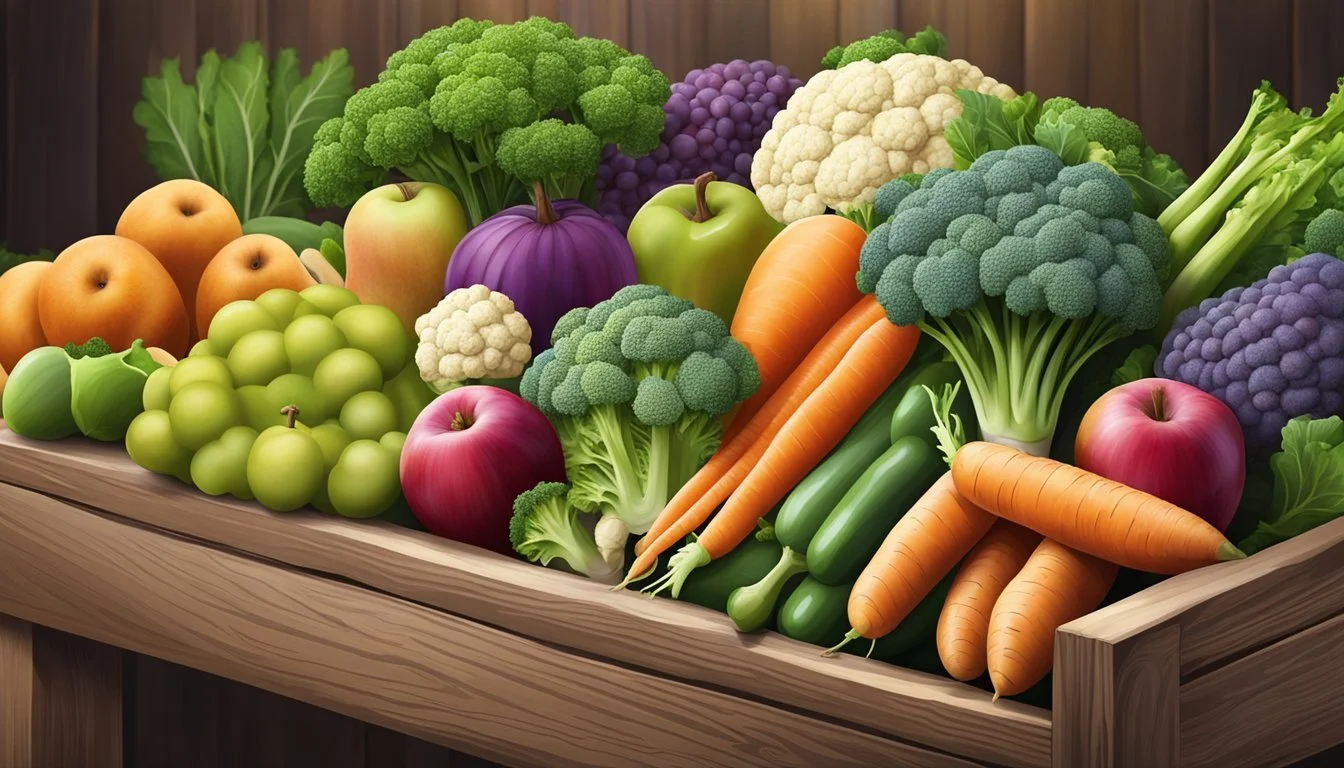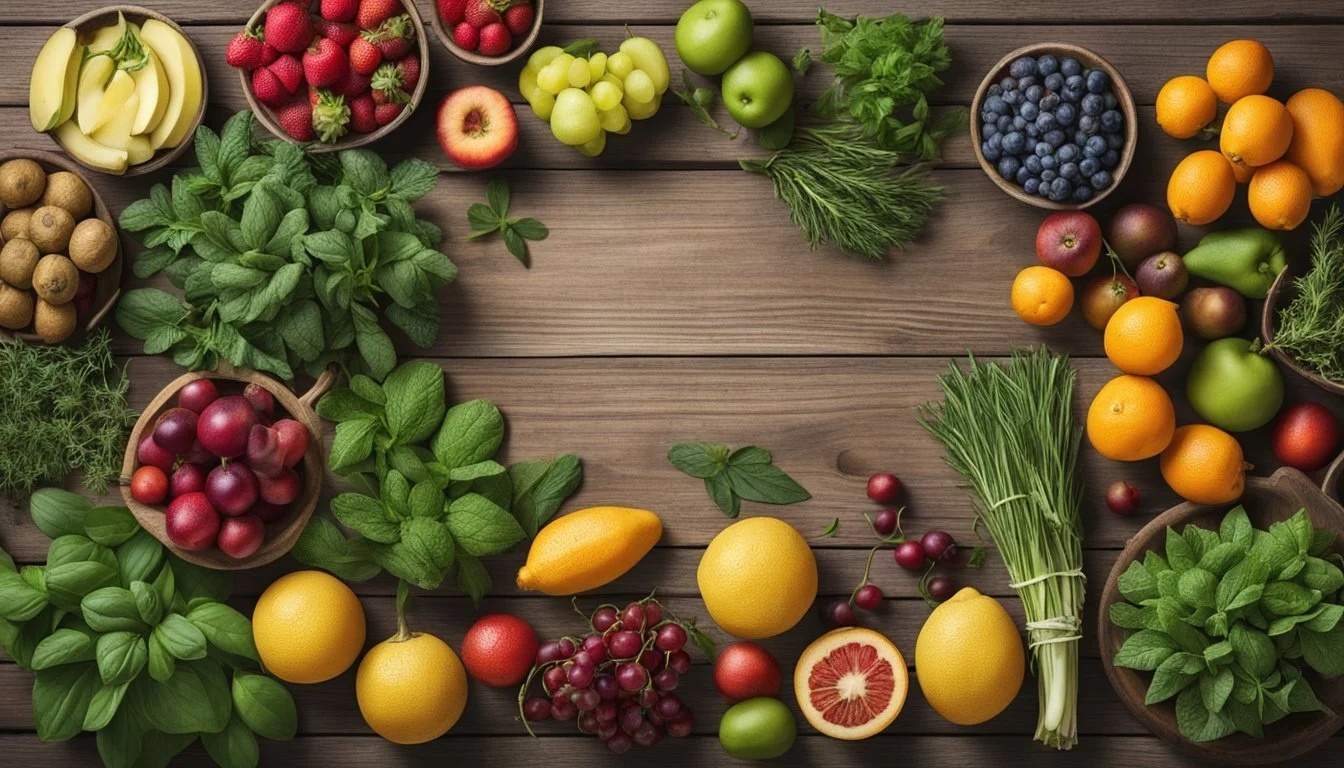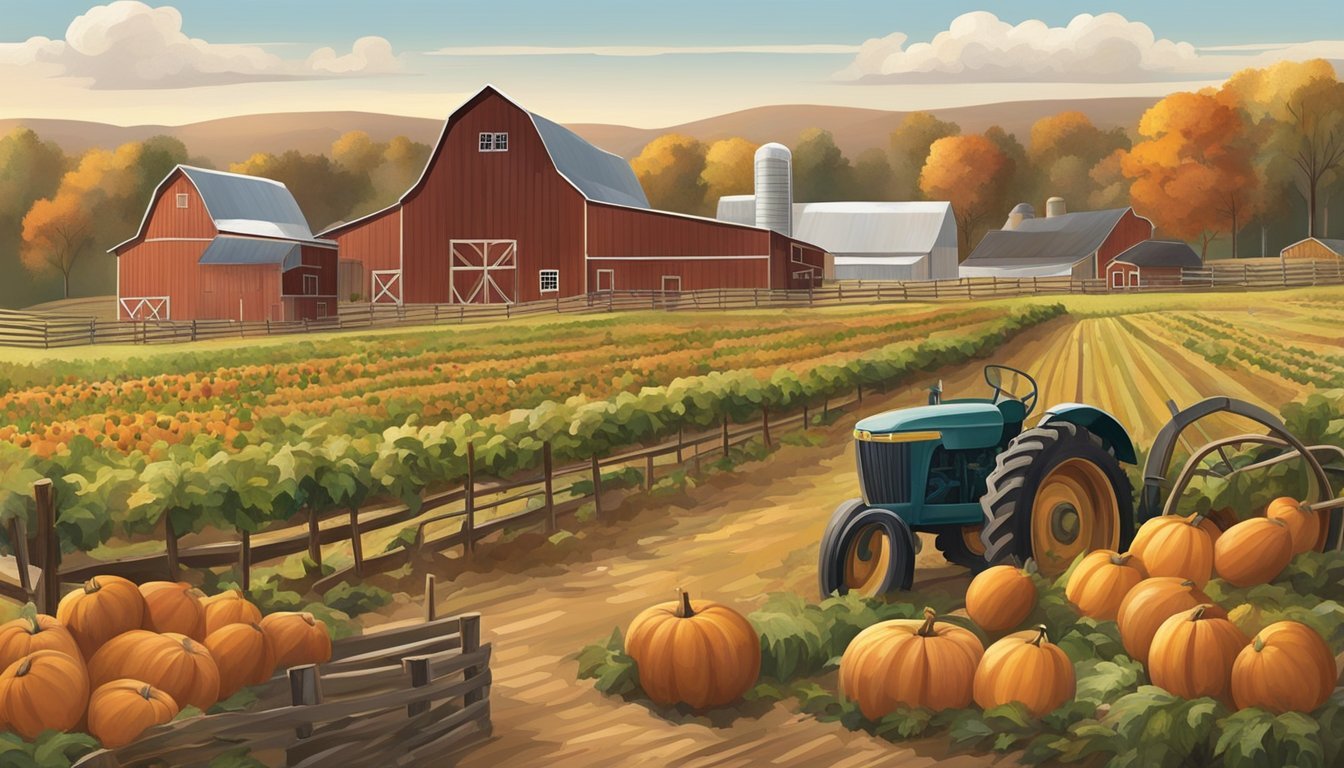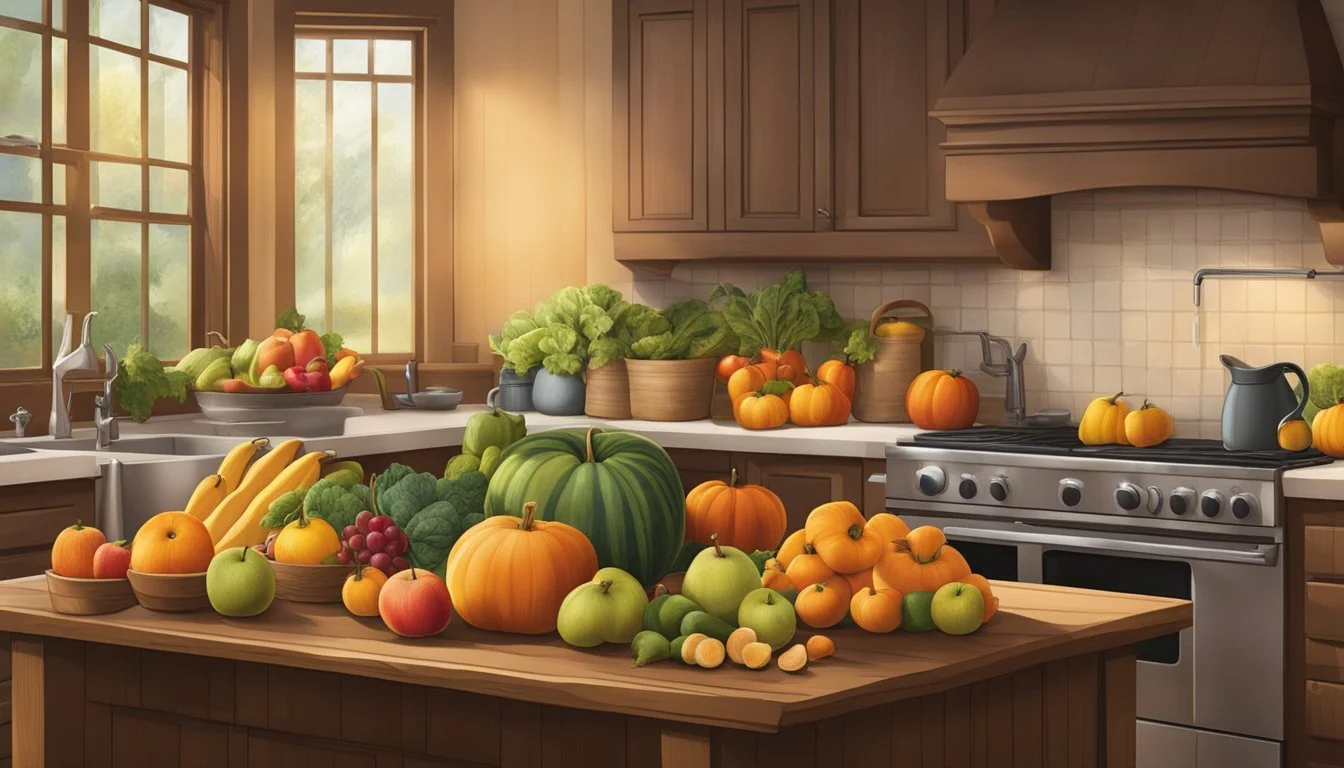Tennessee Seasonal Fruit & Vegetables in December
A Guide to Winter Produce
This Article is Part of our Tennessee Seasonal Fruit & Veg Calendar
In the heart of winter, Tennessee's agricultural scene adjusts to the chilly climate, but that does not mean the fields and markets are barren. Although December marks a quieter time in the state's farming cycle, there remains a variety of seasonal fruits and vegetables available for those looking to embrace local produce. Root vegetables and sturdy greens often take center stage during this month, as they can withstand the cooler temperatures.
Tennessee’s farmers work hard to provide fresh produce even during the colder months. December offerings typically include sweet potatoes, which are a staple in many holiday dishes, and turnips, which add a hearty element to winter meals. In addition to these root vegetables, leafy greens like collards and kale (What wine goes well with kale?) thrive in the cold, delivering both flavor and nutrients.
Local orchards may see the last of the apples (how long do apples last?) being harvested, while winter squash and pumpkins, having been picked in the fall, are still commonly found in storage and available to consumers. Despite the winter chill, Tennessee maintains a selection of its seasonal best, ensuring that residents can enjoy locally grown produce throughout the year.
Understanding Tennessee's Climate and Agriculture
Tennessee's climate can be categorized as humid subtropical, which means it experiences hot summers and generally mild winters. The state spans USDA hardiness zones 5b through 8a, indicating a variance in minimum winter temperatures.
Precipitation is consistent throughout the year, with spring generally being the wettest season. This climate favors a variety of crops, but also requires careful planning to mitigate the risks of frosts in the shoulder seasons.
The growing season in Tennessee varies substantially depending on the region. It can last from as few as 130 days in the higher elevations to over 220 days in warmer areas. This disparity must be considered by those cultivating produce.
Key Gardening Timelines in Tennessee:
Spring Planting: As early as March in some areas
Last Frost Dates: Range from early April to late May
First Frost Dates: Occurs from October to early November
Due to these factors, December sees a limited range of crops, with the focus mainly on cool-weather vegetables and the tail-end harvest of some fruits and vegetables that have storage longevity.
Typical December Produce:
Fruits: Apples (stored)
Vegetables:
Greens (e.g., collards, kale)
Root vegetables (e.g., turnips, radishes)
Agriculture in Tennessee is supported by various microclimates and soil types. Farmers often practice season extension techniques, such as using greenhouses, to diversify their yields well into the winter months. Knowing one's specific regional conditions is crucial for the success of any fruit or vegetable venture in the state.
Seasonal Harvest Timelines in Tennessee
In Tennessee, December marks a transitional period in agricultural activities, as the state moves from the late fall harvest into early winter. This time of year is characterized by harvesting late-season crops and preparing for the upcoming growing season.
Early Winter Harvest
The early winter harvest in Tennessee typically includes a variety of root vegetables and hardy greens that can withstand cooler temperatures. Farmers and gardeners gather crops such as sweet potatoes, turnips, and collard greens (how long do collard greens last?), which have been growing through late summer and early fall. It's also the tail end for apples, which have their peak season in the fall.
Root Vegetables:
Sweet potatoes
Turnips
Beets
Greens:
Collard Greens
Mustard Greens
Kale
Fruits:
Apples (late varieties)
The harvest for these crops is timed to occur before the first frost sets in, ensuring that the produce is collected at peak quality and flavor.
Late Winter Planning
As harvest activities wind down, attention turns to planning for the late winter season. This is when gardeners and farmers assess their inventory, order seeds, and strategize for the next planting cycle. They thoroughly prepare soil beds and greenhouses, considering Tennessee's varying climatic zones, to ensure the rapid start of spring planting.
Preparation Steps:
Soil Enrichment: Infuse beds with compost and cover crops to enrich the soil.
Seed Selection: Choose seeds based on regional climate data and anticipated weather patterns for the upcoming season.
Infrastructure Maintenance: Repair and maintain greenhouses, cold frames, and row covers for plant protection.
By staying attentive to these tasks during the quieter winter months, growers ensure a robust and timely start to the growing season in the spring.
Fruits in Season During December
In December, Tennessee sees a variety of fruits reach their peak. Availability focuses primarily on citrus fruits and certain tree fruits that withstand the cooler temperatures.
Citrus Fruits
Oranges: A burst of vibrant flavor, oranges are among the citrus fruits that brighten Tennessee's December produce selection. They not only bring a pop of color to the winter palette but also offer a juicy, tangy taste that's both refreshing and nutrient-rich.
Tree Fruits
Apples: Crisp and sweet, apples continue to feature prominently in December's offerings. Varieties may vary, but they generally maintain their quality during this month.
Pears: Smooth-textured pears are another seasonal delight. Their subtle sweetness is perfect for both raw and cooked dishes.
Persimmons: Often overlooked, persimmons are a specialty fruit ripe in December. They present a unique flavor, blending sweetness with a hint of spice.
Vegetables Available in December
December in Tennessee sees a variety of vegetables that can withstand the chilly weather. Root vegetables and hardy greens are particularly abundant, offering a nutritious selection for winter meals.
Root Vegetables
In December, the earthy flavors of root vegetables are a staple in Tennessee. The cool temperatures underground allow these vegetables to thrive, offering a sweet and sometimes earthy profile to the seasonal palette.
Beets: Rich in color and flavor, beets are at their best in December.
Carrots: Known for their crisp texture and sweetness, carrots are a versatile root vegetable available during this month.
Turnips: Offering a slightly peppery taste, turnips can be used in a variety of dishes.
Leeks: With a milder onion-like flavor, they are ideal for adding depth to soups and stews.
Leafy Greens
Leafy greens are remarkably resilient in colder weather and can offer a fresh balance to the heavier flavors of winter dishes.
Spinach: This tender green is packed with nutrients and maintains its quality even in the cooler month of December.
Kale: A robust green that can handle the frost, kale's flavor even improves with a touch of cold.
Cruciferous Vegetables
Cruciferous vegetables are not just nutritious; they are also well-suited for the cold and can be found fresh in Tennessee during December.
Brussels Sprouts: These miniature cabbage-like vegetables are at their peak when harvested after the first frost which can sweeten their taste.
Winter Squash: While not leafy, winter squash is often grouped with cruciferous vegetables for its health benefits and is readily available in December.
Herbs and Other Produce
December in Tennessee brings a shift in available produce, particularly in the variety of herbs and alliums. Choices may be more limited compared to the abundance of the summer months, but there are still options for fresh seasonings and flavors.
Herbs
Herbs in December can often be grown indoors or purchased from local growers who use greenhouses. Parsley is one of the hardy herbs that can still be found fresh during this month. It is a versatile herb that can be used in a host of holiday dishes, ranging from savory stews to garnishes for festive meals.
Alliums
The allium family, which includes a variety of flavorful options, remains a staple in December. Onions, with their robust storage capabilities, are usually available during this time and are a fundamental ingredient in countless recipes that suit the cooler weather, from hearty soups to roasts.
Local Farming Practices
Tennessee farmers are known for their commitment to enhancing both the quality and sustainability of their produce, especially as the calendar turns to December when options for fresh produce diminish.
Sustainable Agriculture
Farmers across Tennessee adopt sustainable agriculture practices to ensure productivity even in the colder month of December. They make extensive use of mulching to protect the soil from winter weather and to retain moisture. Mulching also serves to regulate soil temperature and discourage weed growth. On many farms, the use of cover crops is a common practice, which helps to improve soil structure and fertility. Techniques such as crop rotation and integrated pest management are implemented to maintain healthy crops without relying heavily on chemical inputs.
Harvest Techniques
During December, certain harvest techniques are crucial for ensuring the viability of winter crops. Selective farms tend to focus on cold-resistant varieties of fruits and vegetables. The production and harvesting during this time involve special care, including hand picking to prevent damage to the limited produce. Drying is another technique commonly used by Tennessee farmers to preserve fruits and vegetables when they're still abundant, making them available for consumption throughout the winter months. Farmers market these dried goods alongside fresh, cold-season crops.
Exploring Tennessee's Farmers Markets
In Tennessee, December’s farmers markets may not boast the same variety as the summer months, but they still offer a selection of seasonal produce and festive activities. These markets provide a space for local producers to sell their goods directly to the public.
Market Fresh Produce
Visitors to Tennessee's farmers markets in December will find seasonal produce that thrives in cooler weather. Items typically available include:
Root Vegetables: Carrots, beets, and turnips
Winter Greens: Collard greens, kale, and spinach
Apples: A variety of apples from the late harvest
Vendors often offer these alongside other products like jams, honeys, and handcrafted goods. The markets are cherished community hubs where one can support local agriculture and find fresh, locally sourced items.
Pick-Your-Own Farms
While many pick-your-own farms have limited produce in December, some may offer the experience of harvesting Christmas trees or other seasonal items. Farms that operate during this time might provide:
Christmas Trees: A selection of trees for the holidays
Winter Activities: Possible hayrides or bonfires
These farms provide an opportunity for families to engage in the harvest experience, creating lasting memories and traditions. They emphasize the importance of agricultural tourism in Tennessee's rural economies.
Preparing and Storing December Produce
Proper preparation and storage of December produce in Tennessee are crucial for maintaining freshness and extending shelf life. This section provides guidance on how to best handle winter produce.
Storage Tips
Root Vegetables: such as carrots and beets, should be stored in a cool, dark place. Ideally, they can be kept in a basement or root cellar but will last a couple of weeks in the crisper drawer of a refrigerator.
Winter Squash: Cure at room temperature for a week, then store in a cool pantry or cellar where they can last for several months.
Leafy Greens: These should be washed, dried thoroughly, and stored in the refrigerator in a container lined with paper towels to absorb excess moisture.
Preservation Methods
Drying: Apples, which are often plentiful in December, can be sliced and dried for a healthy, long-lasting snack.
Application: Drying is suitable for fruits and can also be used for herbs like sage or rosemary, commonly used in seasonal dishes.
Freezing: Berries, if still available, and late-harvest greens can be flash-frozen to preserve their nutritional value and flavor.
Preparation: Before freezing, blanch vegetables by boiling them briefly and then plunging them into ice water to preserve their texture and color.
Recipes and Uses for Seasonal Produce
During December in Tennessee, the variety of seasonal fruits and vegetables provides an excellent opportunity for creating flavorful and nutritious dishes. Root vegetables and winter squashes tend to have a sweet, nutty flavor that makes them perfect for hearty soups and stews. They can be roasted to enhance their natural sugars or mashed for a comforting side dish.
Leafy Greens like kale and collard greens are nutrient-rich and can be sautéed with garlic and olive oil for a simple yet delicious preparation. For a more complex dish, they are excellent when added to soups or casseroles.
Fruits such as cranberries and pomegranates add vibrant color and a burst of flavor to both sweet and savory recipes. Cranberries can be turned into a tangy sauce or compote, which pairs beautifully with meat, while pomegranate seeds (how long do pomegranate seeds last?) make a visually appealing and tasty topping for salads and desserts.
Sample Recipes Utilizing Seasonal Produce:
Roasted Root Vegetables
Carrots, parsnips, and turnips
Tossed in olive oil and herbs
Winter Squash Soup
Butternut or acorn squash
Blended with vegetable stock and spices
Kale and Collard Greens Sauté
Garlic and red pepper flakes (how long do red pepper flakes last?)
A splash of lemon juice for freshness
Cranberry Sauce
Sweetened with orange zest
Perfect as a side or sandwich spread
Pomegranate Salad
Mixed greens, goat cheese, and walnuts
Drizzled with a balsamic reduction
By incorporating these seasonal fruits and vegetables into their recipes, Tennesseans can enjoy the fullest flavors of the month while also taking advantage of the nutritional benefits these produce items offer.
Promoting Local Agribusiness
Tennessee's December agribusiness activities pivot to enhancing local economies and offering a seasonal experience through the utilization of agricultural tourism and community supported agriculture programs.
Agricultural Tourism
Agricultural tourism, often known as agri-tourism, involves inviting the public onto farm premises for educational and recreational purposes. In December, farms in Tennessee may not have the abundant produce of the summer months, but they still provide unique opportunities such as visits to pumpkin patches and navigating through corn mazes. These attractions not only encourage direct sales but also help in fostering a connection between consumers and the origins of their food. Farmers markets operate as a nexus for agri-tourism, displaying a diverse selection of local produce and goods, even during the colder months.
Community Supported Agriculture (CSA)
Community Supported Agriculture (CSA) programs are vital in sustaining local agribusinesses especially when the land lies fallow. Customers purchase subscriptions, providing farms with a stable income stream and in return, they receive regular deliveries or pickups of fresh produce, including winter crops that can withstand the cold, like certain varieties of greens. Such programs cement a bond between the farmer and the consumer, and champion a commitment to local, sustainable agriculture.
Conclusion
Tennessee's climate supports a diverse range of produce during December, catering to those seeking fresh, local fruits and vegetables. The list below highlights what consumers can typically expect to find:
Fruits: Although fruit variety is limited in December, options such as apples remain abundant.
Available Fruits Apples
Vegetables: Cool weather crops thrive, and December offers an array of vegetables:
Common Vegetables Sweet Potatoes Winter Squash Turnips Kale Collards
Tennessee's local produce not only supports sustainable eating but also provides rich nutrients essential during the colder months. It is an opportune time for consumers to explore the range of produce available, integrating seasonality into their diet. Farmers’ markets and local groceries are the best sources for the freshest selection. Through such outlets, they contribute to local economies and reduce the carbon footprint associated with long-distance food transportation.
While this season may not yield the same quantity as the bountiful summer months, the quality and nutritional value of Tennessee's winter produce make it a worthy addition to any meal. Residents and visitors alike are encouraged to take advantage of December’s seasonal offerings.













